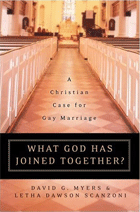 What God Has Joined Together? A Christian
Case for Gay Marriage
What God Has Joined Together? A Christian
Case for Gay Marriageby David G. Myers & Letha Dawson Scanzoni
Harper San Francisco, 2005
Hardcover, 182 pages, 17.95
Even before a single word of this book is read by those on either side of the cultural battleground over "gay marriage," the title is enough to raise the battlecries. So I won't mince words. I'm coming into this battle on the side of equal (not separate or special) rights for gay people—which includes gays, lesbians, bi-sexuals, and transgendered individuals. But for the sake of focus, I will limit the discussion to same-sex marriage.
The cover graphic is enough to confuse the issue of gay marriage, since it's a shot of the inside of a church. When gays speak of "marriage" they're talking about the civil union, the legal joining, the one that gives them inheritance rights, tax breaks, and 999 other rights that heterosexuals gain merely by joining in a legal contract with one another—a contract that has thus far been denied gays. So even before I begin a discussion of the merits of this book, it bears pointing out that when it comes to denying marriage to gays and lesbians, heterosexuals who cry "special rights" every time gays want a little legal protection in jobs and housing, it is painfully obvious that heterosexuals are the ones who want the really substantial special treatment. It has been said that marriage is the cornerstone of our society, the foundation of family, the backbone of our moral body. Anti-gay marriage advocates want to prevent glbt people from sharing in all that this foundation grants to them.
Thus far, as the authors point out in this book, in the great debate about gay marriage from the courts to the churches, one perspective that has been missing is that of thoughtful, pro-marriage Christians who, informed by their faith, support not only the concept of same-sex marriage, but insist that it will strengthen, not weaken the institution of marriage, strengthen, not weaken our society. Thus far, the only "Christian" voices that have been heard have been those in the religious right—the fundamentalist "Christians" who are in lock-step against any rights for gay people.
In the beginning chapters of the book, the authors point out, not only the importance of marriage, but also the human urge to belong to a society, to a family, and that all of us (not just heterosexuals) thrive in close, supportive, committed relationships. The chapter on "The State of Our Unions" shows that traditional marriage is troubled, tenuous, and that co-habitating even by heterosexuals is flourishing while divorces continue to soar. In "A Newer World," the authors make the case that we need a future "in which all sorts of parents in all sorts of families will...find themselves riding not against the cultural winds, but with the winds at their backs." The "traditional" one man, one woman, with children family is certainly needed, but so are any arrangements where same-sex partners are also parents.
The chapter on "Understanding Sexual Orientation" seeks to clarify the argument as to whether sexual orientation is a choice or something intrinsic to the person who is gay or lesbian. This is an important question, one upon which the entire fundamentalist "Christians" denial of marriage to same-sex partners rests. The fundamentalist must believe that being gay is a choice. Other Christians who tend to support same-sex unions will be relieved to know that evidence says that being gay is not a choice. The authors of this book provide greater evidence on the side that says sexual orientation is a predisposition. And a companion discussion to sexual orientation is the debate about whether or not it can be changed, or even should be changed. They list numerous "remedies" and organizations that promise change but fail to deliver on that promise.
And then Myers and Scanzoni turn to the Bible to see what it does and doesn't say in the handful of verses often quoted to condemn homosexuality. The Sodom story is not about homosexuality. Nor is the word "abomination" applied to homosexuality as much as it is to condemn lying, unjust business practices, pride, and stirring up dissension. In the "Credits", the authors base their biblical reading on The New Revised Standard Version (NRSV), 1989, Division of Christian Education of the National Council of the Churches of Christ in the USA, and give a complete list of all other sources of direct quotes. Had they used other translations, they would find that the word homosexual appears in the Corinthian text, often as a substitute word for "effiminate." But in fact, the word effiminate usually meant a womanizer and not a homosexual male.
In the latter half of this book, the authors go directly to the question of gay marriage. Put simply, in terms of healthy behaviors for both heterosexual and same-sex sexuality, marriage and fidelity promote the most healthy behaviors and reduces the risk of STDs. Further, marriage for all people, in male-female, male-male, and female-female relationships, achieves equality in privilges and duties, rights and responsibilities. In a step-by-step process, Myers and Scanzoni refute the seven basic arguments against gay marriage. They won't be listed here, but the list and their refutation are contained in the chapter titled "Gay Marriage."
I hazard to conclude that What God Has Joined Together: A Christian Case for Gay Marriage is the most exhaustive argument to date from a Christian Perspective. Further, it is not from the point of view of a gay or lesbian arguing the case for themselves, but from two heterosexuals, both married, with children, who have no other vested interest but asking why not?
This book will be most useful to other Christians who want to extend rights and responsibilities to their glbt brethren (if I can use that term); also useful to glbt Christians and those of other faiths.
—Ronald L. Donaghe, Las Cruces, NM